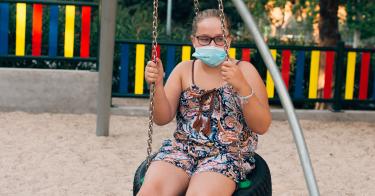In January, the American Academy of Pediatrics (AAP) released a new study on childhood obesity. Their recommendation sparked outrage: beginning at age 12, obese kids are eligible for weight loss drugs. By age 13 they qualify for weight loss surgery. For children, “obese” means that they weigh at or above the heaviest 95th percentile of kids of the same age and sex.
In America today, that equals 14.4 million children.
The AAP’s concern about such a high number of obese children makes sense. Childhood obesity leads to lifelong problems like heart disease, diabetes, and infertility. The way the AAP wants to go about fixing it, however, is where the trouble starts.
The AAP described their goal to care for the “whole child.” This approach makes government-run public schools the central location for care.
Two aspects of the “whole child” agenda go together. The first is the push to rely on medical intervention over lifestyle changes and counseling. The second is the willingness to take decision-making power from parents and give it to unelected, unaccountable administrators.
>>> Childhood Obesity Epidemic Calls for Cutting Screen Time in Schools
“Whole child” is shorthand for the Whole School, Whole Community, Whole Child (WSCC) program. It’s funded by actors such as the United Nations, Department of Education, the Centers for Disease Control and Prevention (CDC), National Education Association, Association for Supervision and Curriculum Development (ASCD), and has partnerships with medical groups like the American Academy of Pediatrics (AAP).
Each group uses the language of “whole child” support with, in, or through a government-run school. A recent example of this is Biden’s State of the Union address. “We can do better… [by] integrating mental health services into settings that are more familiar, such as schools.” This promise is accompanied by an additional $280 million in mental health-related grants to the Department of Education.
WSCC’s emphasis on the “whole” child is nothing short of a collectivist ideology. The goal is to make government-run schools, not the family or the home, the central tenet of a child’s life. It would place all medical records, access to healthcare, and social services within each K-12 school.
The AAP’s guidelines call for a “whole child” approach to solving obesity. In 2021, the AAP received a grant from WSCC to implement “COVID-19 Guidelines for Safe Schools.” WSCC graded the AAP’s efforts in 10 areas. It gave the AAP full marks in behavioral support, health services, and nutrition. Notably, the AAP’s grant barely touched on community involvement or physical activity.
Two years later, the AAP’s report on child obesity focuses on medical interventions and school-based care. Moreover, they are careful to mention the supportive, not primary, role of parents.
To their credit, the AAP’s study recognizes many issues that contribute to weight gain—from divorced or single-parent homes, fast food heavy diets in the car, financial stress, to cultural habits. Still, Dr. Sandra Hassink, medical director for the AAP Institute for Healthy Childhood, said in an interview that they want to “erase the inaccurate picture of obesity as ‘a personal problem, maybe a failure of the person’s diligence.’”
What’s worse, the AAP discusses the role of parents after schools, healthcare providers, and social service providers. When it comes to effective “whole-child” healthcare, the parents are relegated to fourth place.
“Schools provide mental health and nursing services to address children’s daily health needs and support long-term chronic condition management through care planning and coordination, self-management education, counseling, and other services. Health care providers, school-based health centers, health care systems, and public health agencies work to prevent, diagnose, and treat chronic conditions in children. Mental health and social service providers attend to emotional and behavioral factors related to chronic conditions and address social determinants of health that influence chronic disease outcomes. Families identify, support, and advocate for their children’s needs across settings.”
>>> Lawmakers, Let Parents Have a Say in Their Children’s Life-Changing Decisions
The days of nutrition, exercise, and educating parents on healthy nutrition are long gone. Instead, families play an observant role, supporting the primary work of the school in caring for their children.
The AAP’s guidelines describe obesity as a host of factors that “act on” the family. Even the language of obesity “acting on” families undermines parental agency and responsibility. The APP’s solution places children on expensive medications or invasive surgical procedures to lose weight.
The AAP’s justification for this comes from a troubling report. “A study of mothers and children found that an alarming 62% of parents with obese children perceived their child’s weight as healthy.” Parents struggle to recognize or admit that their child is obese. Still, the answer is not to diminish the role of parents. A multifaceted issue like child obesity requires many approaches to solving it, beginning with parents.
It’s time to examine the connection between the American Academy of Pediatrics and the Whole School, Whole Community, Whole Child program. We should be suspicious of any approach that primarily promotes expensive medical interventions to solve obesity or mental health problems. Especially if it undermines the role of parents.
This piece originally appeared in the Daily Caller




